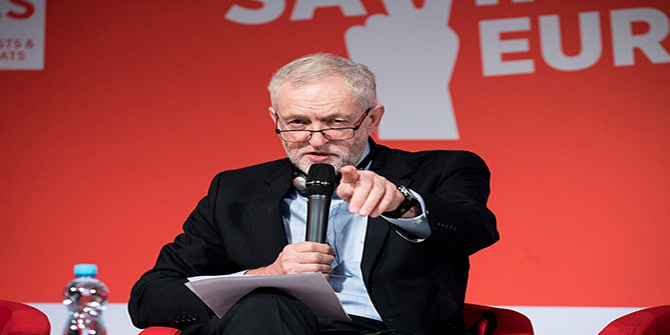 Much of the Parliamentary Labour Party want to replace Jeremy Corbyn, and his popularity among the general public is low. Yet he was resoundingly re-elected by party members last autumn. Patrick Diamond assesses the Labour leader’s performance as an opposition leader according to five criteria, and concludes the risk of a Labour schism between ‘principles’ and ‘power’ – of the kind that rived the party in the early 1980s – is considerable.
Much of the Parliamentary Labour Party want to replace Jeremy Corbyn, and his popularity among the general public is low. Yet he was resoundingly re-elected by party members last autumn. Patrick Diamond assesses the Labour leader’s performance as an opposition leader according to five criteria, and concludes the risk of a Labour schism between ‘principles’ and ‘power’ – of the kind that rived the party in the early 1980s – is considerable.
As criticism of Jeremy Corbyn’s performance as Labour leader grows louder (at least in the popular media and general opinion surveys), it is worth examining what the literature on political leadership tells us about why party leaders succeed or fail. Stuart Ball has outlined five criteria by which to judge an effective opposition leader in UK politics:
- First, ‘fresh faces’: does the leadership promote talent to signal a change of political generations and the renewal of the party in the wake of electoral defeat?
- Second, ‘cohesion’: are they able to maintain loyalty and discipline to project a unified image to the electorate?
- Third, ‘visibility’: is the leader able to fashion a distinctive, eye-catching agenda which captures the imagination of the electorate, wins the confidence of opinion-formers, and distances the party from a potentially ‘toxic legacy’?
- Fourth, ‘efficiency’: has the leader been able to build a party machine that can take on the government of the day?
- Finally, ‘adaptability’: is the leadership sufficiently pragmatic to respond to events, changing its strategy where necessary to win power?
Ball’s five yardsticks offer comprehensive – if parsimonious – criteria for assessing the performance of opposition leaders.
Inept party management has been a key factor in Corbyn’s weak leadership performance. Corbyn came under criticism following his first round of Shadow Cabinet appointments, failing to appoint more women to senior positions and undermining his commitment to bring in ‘fresh faces’. His frontbench reshuffles since have been attacked for being poorly co-ordinated, exacerbating the perception that Labour was a divided party.
The ‘cohesion’ of the party has been undermined by the structural problem that Corbyn’s leadership confronts: his narrow base of PLP support. Having won the votes of only 15 MPs in the leadership contest (the other 20 MPs who nominated him did so to ensure the Left had a candidate), Corbyn has struggled to maintain his legitimacy within the parliamentary party. As a ‘serial rebel’ under previous leaders, he struggles to play the loyalty card effectively. The handling of the Trident and Syria votes indicated major party management problems; Corbyn’s ‘prevarication’ about whether to allow a free vote on Syrian intervention signalled he has no plausible strategy to manage his parliamentary colleagues; the attempt to put pressure on MPs through directives from Momentum and the decision to conduct a last minute plebiscite among party members merely antagonised parliamentarians (66 MPs then voted with the government)
These tensions exploded into the open in the summer of 2016 when Corbyn’s PLP colleagues sought to oust him in favour of Owen Smith, the ‘moderate’ candidate. Corbyn’s objective is to democratise the Labour party by promoting greater participation and pluralism, but opponents insist he is intent on ‘purging’ Labour of its residual ‘Blairite’ elements.
Corbyn has encountered additional problems in projecting ‘visibility’. He had been written-off by most opinion formers and a hostile press, even as his victory in the recent leadership contest was confirmed. He may have links to liberal-left newspapers, but while The Guardian/Observer have a combined online audience of 5.3 million, the vociferously hostile Sun and Sun (Sunday) have 13.5 million readers. There are doubts about the breadth of Corbyn’s appeal given his cultural identity as a left-wing metropolitan liberal representing the constituency of Islington North, allegedly ‘a world away’ from the concerns of most uncommitted Labour voters. Some point out that a moderate version of Corbyn’s views on the central policy issues relating to the economy, welfare, immigration and foreign affairs was decisively rejected by voters in the 2015 general election.
Neither is Corbyn in a position to ignore or discount electability, as his allies struggled to explain Labour’s poor performance in the recent Copeland and Stoke Central by-elections. It might be argued that any leader would have a formidable task in restoring Labour’s ‘efficiency’ as an opposition party. Labour has not won a major election for a decade, while the party has suffered a sharp erosion of support due to the unpopularity of its previous leaders and its inability to manage the issue of immigration (see here).
The 2015 election underlined the fracturing of Labour’s electoral base, particularly in Scotland where the party’s vote haemorrhaged. In the North of England, Labour’s traditional strongholds have been under attack from the UK Independence Party. The social base of the labour movement, notably trade union membership, has suffered a marked decline. Labour’s travails cannot be attributed solely to Corbyn’s leadership performance; but as John Curtice has pointed out: ‘it can often be difficult to disentangle cause and effect in the relationship between a party’s overall standing and the rating of its leader’.
Finally, there are clearly limits to Corbyn’s ‘adaptability’ which have undermined his success. He rejects the hard-headed instincts of previous leaders, while his commitment to Labour as a party of government is ambiguous. Corbyn’s supporters are less motivated by the imperative of winning elections; they want to articulate their values and reject the New Labour legacy of Iraq and inequality. According to YouGov, 71 per cent of those who voted for Corbyn in the leadership contest believed parties should put forward policies ‘irrespective of whether they help to win elections’. In rejecting New Labour, Corbyn is emphasising his reluctance to play the game of ‘valence’ politics, despite the fact ‘valence’ remains the best predictor of electoral outcomes in Western European democracies.
In building up his own Momentum organisation and trying to amend the constitutional rules of the Labour party to favour the Left, Corbyn has sought to ‘make the weather’ as leader rather than accepting the structural context he inherited. This strategy was comprehensible in its own terms; the Left has an unprecedented opportunity to refashion the Labour party in its image, a position it will be reluctant to forfeit after decades in the wilderness. The risk for Corbyn, however, is that efforts to reshape the PLP in the leader’s image recreate the historical schism between ‘principle’ and ‘power’ that almost destroyed Labour in the early 1980s. Major question marks over the viability of Corbyn’s long-term leadership are likely to remain.
_______
This post was originally published on Democratic Audit.
 Patrick Diamond is University Lecturer in Public Policy at Queen Mary, University of London.
Patrick Diamond is University Lecturer in Public Policy at Queen Mary, University of London.
Image credit: PES Communications, CC BY-NC-SA









The issue is that Corbyn is such an honourable individual that he won’t resign unless the membership get rid of him in favour of a centrist candidate. Or another plausible way is if the threshold for getting onto the leadership ballot is reduced to 5% so Rebecca Long-Bailey or Angela Raynor can get on. The Right of the party have one more opportunity to strike between now and 2020 if they want to regain the levers of the party’s rusty machinery. But it must put up a heavyweight figure like David Milliband to stand a chance and not a lightweight like Owen Smith.
However the membership,were given two opportunities and he won easily both times.
David Miliband is an able and intelligent guy, like his brother, but he lost the labour leadership,contest to him and has been out of British politics for a while now.
Top of my wish list is that the PLP could set an example and unite.
I do not think it is much to ask for when hardworking loyal people like me and thousands of others ieverunsecind if their share time in all westhers are doing their best to campaign for the NHS and canvass during crucial local election and ifmwe can jog along together as volunteers somshoukd they as they are representing us. That is why the electorate get disheartened and apathetic,
I hear it all the time on the door step. I feel they do us and the public a great disservice.
Please excuse the dreadful typos in the above comment. It was late at night the reply box is exceedingly small and my eyes are not so good. My apologies.
I agree with the above points, which are well made. I do think that Corbyn has been vilified from the off with the majority of Labour MP’s constantly exaggerating his “hard-left” credentials, which have been readily and uncritically absorbed by the right-wing press, which includes the Guardian. Most new leaders are given time to settle into the role and gradually emerge as a leader, but no such assistance was offered to Jeremy – just endless opposition and back-stabbing. The result is that the public are actively taken back to the 1970/1980’s, whereas Corbyn’s Centrist economic policy of “Investment-Led Growth” is distinctly Post-Neoliberal Capitalism and points the way forward for most western countries that suffer from economic stagnation, low growth and low productivity. Labour has created a damaging mess through focussing on internal politics and is seen as a divisive party, where nastiness is ever-present amongst many of its politicians, who are ruining the party’s public prescence.
I agree.
And who is Stuart Ball to tell us what the criteria is for leadership? What a surprise he is an adviser to The Conservatives!!
Biography
After studying at the University of St. Andrews, I was appointed to a lectureship in History at the University of Leicester in 1979, where I taught until retiring as Professor of Modern British History in October 2016. I have been a Fellow of the Royal Historical Society since 1990, and am Historical Consultant to the Conservative Party Archive at the Bodleian Library, University of Oxford. I am a member of the editorial committee of the journal Parliamentary History, and a Trustee and the Treasurer of the Parliamentary History Trust.
I am a long standing veteran labour supporter and member. I work very hard in my constituency alongside many of my party members to protect the well being of our local citizens, by campaigning to save our vital and essential services despite the massive cuts from central government.
I do not consider myself far left but I do consider myself a democratic socialist and as such honour the wishes of the majority of the party members when we elected Corbyn as leader twice.
I have listened to what Corbyn has to say at small meetings and big conferences. I was at the NHS rally in London with cross party representatives and his inspirational speech there was cheered by thousands .
He is a good man with many desireable qualities often lacking in career politicians and I find this article somewhat one sided in its criticism by overlooking this basic fact. It is a pity the media does not give him a fair hearing and report accurately what he stands for, which is a just, more equal and better world for ordinary people.
The writer is also a former director of Progress and adviser to Peter Mandelson, both strongly associated with the “moderate” wing of Labour that remains powerful (if no longer unchallenged) in the PLP and the party machinery. A certain point of view on Labour’s problems is perhaps therefore to be expected.
Incredibly bad timing though to be putting that out there when coming up to the local county and city elections, appalling in fact. See my comments above, with all the typos, so exhausted from canvassing and campaigning!!! Eyesight not so good either.